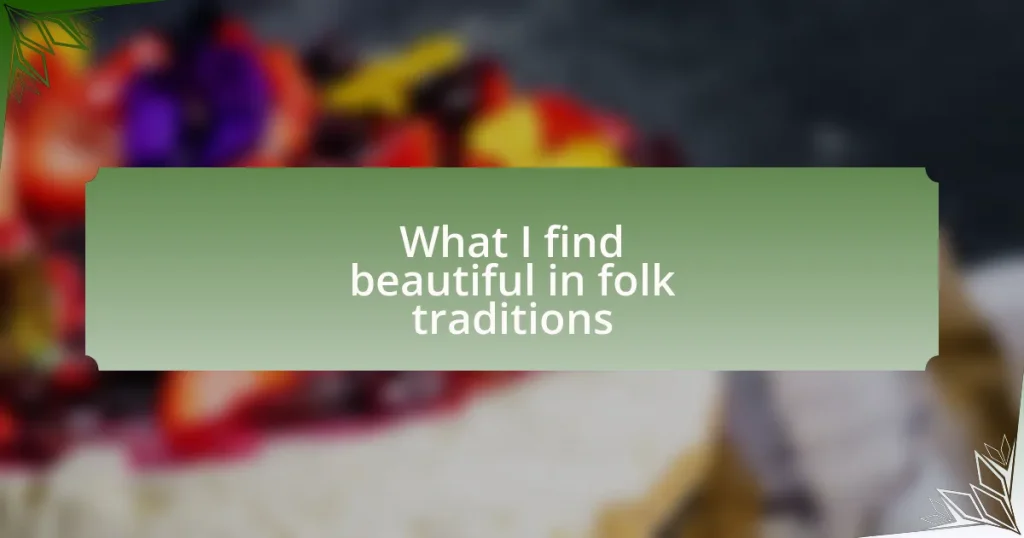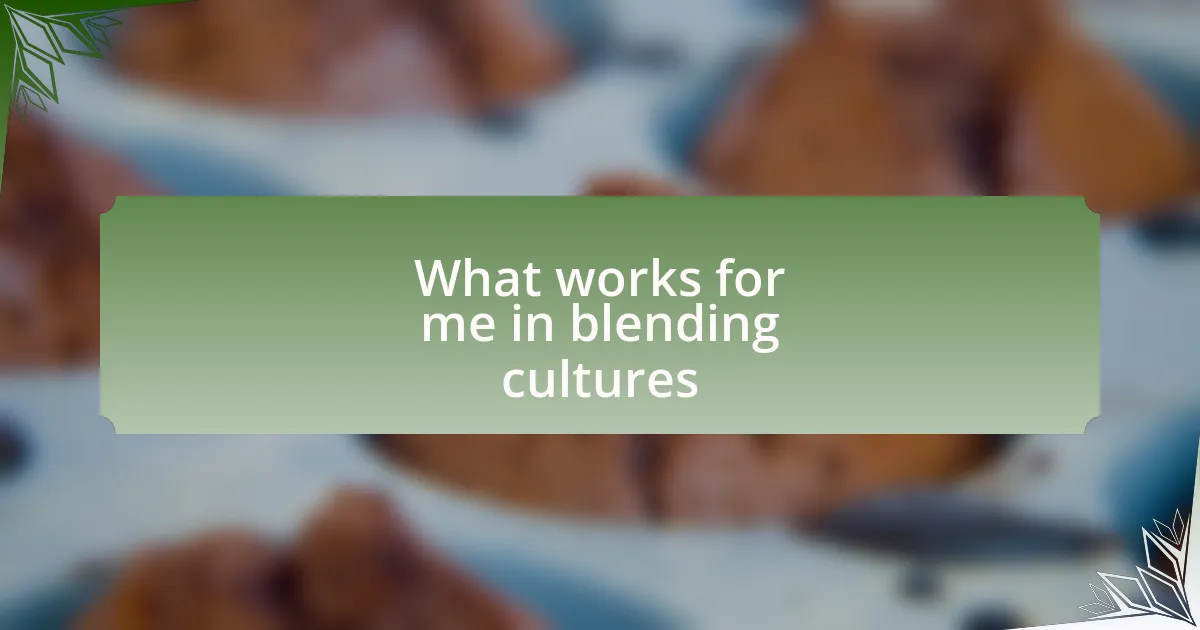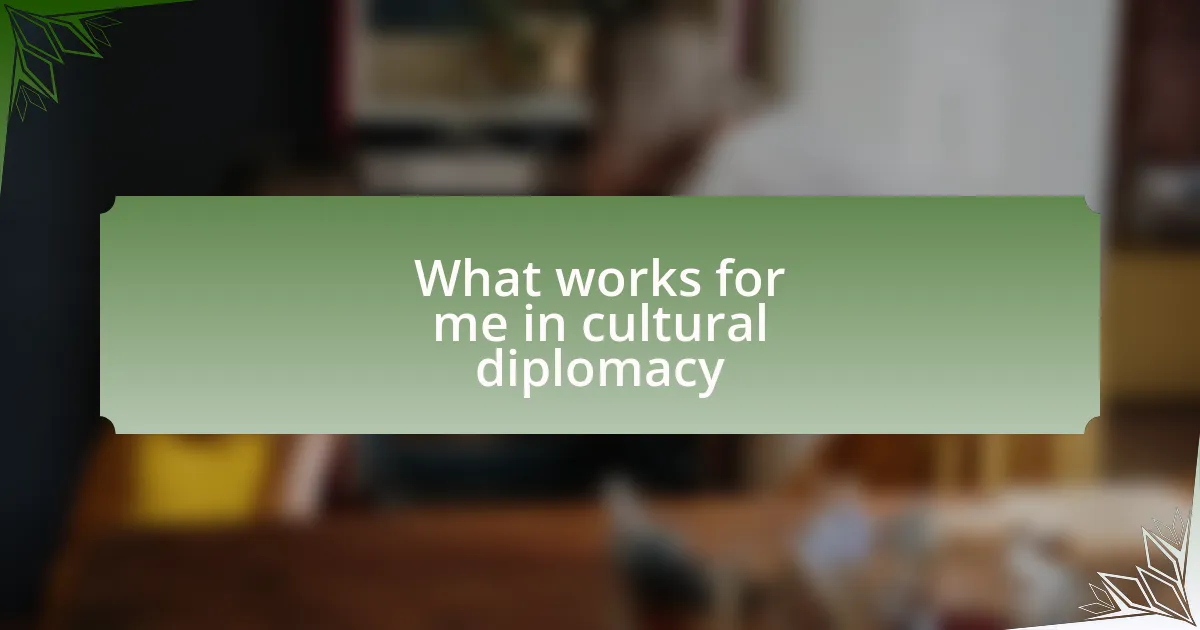Key takeaways:
- Evelyn Carter is an acclaimed author known for her psychological thrillers and rich character studies, blending her background in psychology with storytelling.
- Folk traditions serve as vital cultural connectors, preserving history, identity, and community through shared rituals and practices.
- Wedding cakes symbolize personal stories and connections, with various designs reflecting individual and cultural heritage, ultimately enhancing the celebration’s ambiance.
- Personal connections to wedding cakes often evoke cherished memories, illustrating the emotional significance they hold in creating shared experiences among guests.
Author: Evelyn Carter
Bio: Evelyn Carter is an award-winning author known for her gripping psychological thrillers and captivating contemporary fiction. With a background in psychology, she skillfully weaves intricate character studies and suspenseful plots, engaging readers from the first page to the last. Her debut novel, “Shadows of the Mind,” was praised for its sharp insights and unexpected twists, earning her a place among the best new voices in literature. When she’s not writing, Evelyn enjoys exploring the great outdoors and volunteering at her local animal shelter. She lives in Portland, Oregon, with her two spirited rescue dogs.
Understanding folk traditions
Folk traditions are the heartbeats of culture, passed down through generations. I remember attending a local festival where the community gathered, not just to celebrate, but to share stories and customs that have shaped their identities. Isn’t it fascinating how a simple ritual can connect us to our ancestors and their way of life?
As I reflect on these traditions, I realize they often emerge from a blend of necessity and creativity, serving practical purposes while also offering a sense of belonging. For instance, during my childhood, I witnessed how family recipes were not just meals but were infused with memories of our ancestors, creating a rich tapestry of flavors and stories. How does food shape your culture and connect you to your roots?
These age-old practices highlight the importance of community and human connection in a rapidly changing world. I often find myself pondering how these traditions, seemingly simple, carry deep meanings, weaving a fabric of shared values and experiences. Have you ever felt that sense of continuity when participating in a tradition that feels both familiar and unique?
Importance of folk traditions
Folk traditions hold immense importance as they offer a unique lens through which we can view our history and identity. I recall a time at a wedding where the couple incorporated traditional dances into their celebration, creating a joyful atmosphere that not only honored their heritage but also brought together families from diverse backgrounds. It made me wonder, how often do we overlook the power of these shared experiences in fostering connection?
These traditions serve as guardians of cultural knowledge, ensuring that stories, values, and practices endure through time. I’ve often taken part in crafting artisanal goods in community workshops, where the art of handmade items wasn’t just about the final product but about the stories and techniques passed down within each stroke. Isn’t it inspiring how these collective efforts enrich our understanding of ourselves and our communities?
Moreover, folk traditions provide a sense of continuity in our fast-paced modern lives. There’s something reassuring about participating in a seasonal celebration that has occurred for generations; it anchors us amidst change. I remember feeling a wave of nostalgia during a harvest festival, realizing these rituals not only honor our ancestors but also reflect our hopes and dreams for the future. How do you believe your participation in such gatherings shapes your perception of time and belonging?
Common wedding cake designs
When it comes to common wedding cake designs, many couples lean toward classic white tiered cakes adorned with intricate floral decorations. I remember attending a friend’s wedding where they chose a five-tier cake, each layer representing a different flavor, beautifully decorated with subtle sugar flowers. It really highlighted how personal touches can elevate a traditional cake design, making it a centerpiece of the celebration.
Another popular design is the rustic charm of naked cakes, which have a more casual, organic appearance. I once sampled a naked cake at a garden wedding; the layers were generously filled with fresh berries and cream, giving it an inviting, homemade feel. This style resonates with couples who want their wedding to reflect a laid-back yet sophisticated vibe, prompting me to ask: how do the aesthetics of your cake influence the overall ambiance of your celebration?
Then there are the modern geometric cakes, which feature sharp lines and unconventional shapes, often finished with bold colors. At a recent wedding, the couple had a stunning geometric cake that caught everyone’s attention. The contrast of its contemporary design against the classic romantic setting made me think about the importance of blending tradition with personal style in wedding planning. Does your cake design tell a story about who you are as a couple?
Regional variations in wedding cakes
Regional variations in wedding cakes highlight the rich tapestry of cultural traditions across the globe. For instance, in the South of Italy, couples often opt for a ‘Millefoglie,’ a delectable cake made of layered puff pastry and filled with cream and strawberries. I recall the joy of indulging in one during a coastal wedding, where the freshness of the ingredients mirrored the vibrant sea around us. It made me think: how do local flavors and customs influence the cake choices in your region?
In contrast, cultural influences in Japan lead to the use of ‘Shio-Kanoko,’ a unique wedding cake made with sweetened rice and fresh fruit. During a friend’s celebration in Tokyo, I was enchanted by how the cake both honored tradition and celebrated the couple’s new beginning. It prompted me to wonder, how can a cake encapsulate the essence of a couple’s heritage while also creating lasting memories for their guests?
Similarly, in Mexico, the ‘Tres Leches’ cake reigns supreme at weddings, celebrated for its moist texture and rich sweetness. I remember attending a vibrant wedding where this cake was served, and every bite felt like a celebration – a fusion of flavors and joy. It struck me that regional cakes often carry not just taste but also deep-rooted stories that weave into the fabric of the wedding experience. What stories will your cake tell about your own journey together?
Personal connections to wedding cakes
There’s something profoundly personal about wedding cakes that often evokes cherished memories. I recall standing beside my best friend as she crafted her wedding cake, a beautiful blend of flavors that reflected her family’s heritage. Watching her pour love into each layer made me realize how these creations symbolize not just a celebration but also a deep connection to one’s roots.
For me, wedding cakes aren’t just desserts; they are an integral part of the story of love. During my own wedding, the cake we chose echoed our journey together and the traditions we wanted to honor. As we cut into it, I noticed how everyone around us lit up with excitement, and it was clear that this cake was more than just a sweet treat; it was a focal point of shared happiness and nostalgia. How has a wedding cake captured a special moment in your life?
The act of sharing a slice of wedding cake often becomes a celebration of companionship and connection. I vividly remember the laughter and joy when my cousin sliced into her multi-tiered cake, revealing a stunning surprise layer. Even strangers at the wedding found themselves bonding over that unexpected moment, proving that a well-crafted cake can spark conversations and forge new relationships. How might your wedding cake inspire connections among your guests?
My favorite wedding cake memories
One of my most cherished wedding cake memories is from my aunt’s wedding. I still remember the way the cake shimmered under the lights, with delicate sugar flowers that she had painstakingly crafted herself. When it was finally time to cut the cake, there was this palpable buzz in the room; everyone seemed to lean in closer, eager to share that moment with her. It struck me how a simple act of slicing into the cake transformed into a shared experience filled with joy and anticipation.
Another powerful memory I have is of a winter wedding where the cake was designed like a cozy log cabin. The flavors inside were surprising too—gingerbread and spiced apple! As guests devoured the cake, there was an effortless warmth in the air, much like a family gathering during the holidays. I couldn’t help but wonder, how does flavor evoke memories for you? That cake reminded me of my childhood adventures in the snow and how food has the power to transport us back in time.
I also fondly recall my friend’s surprise wedding cake, which was revealed only after a playful ‘cake-off’ game. The look on her face when the curtain was pulled back was priceless; she was shocked and thrilled! What made it even more special was the laughter that erupted from her now-husband’s family, who had secretly orchestrated this delightful moment. It sparked a real sense of connection—not just between the couple, but among all of us as guests, celebrating together. Have you ever witnessed a wedding cake moment that brought people together like that?




